The unprecedented emergence of Covid-19 pushed grocery retailers to harness the power of digitalization. As the focus quickly transitioned to employee and buyer safety, retailers opted for grocery eCommerce solutions to meet the pent up consumer demands.
While the initial phase of the outbreak was chaotic, looming with uncertainty, it gave rise to grocery eCommerce softwares with advanced features and functionality. Solutions that were ready to launch with mobile apps for grocery shopping and delivery were adopted at pace.
Keeping in mind, the requirements of users, listed below are the top 10 grocery softwares that enable businesses to do more.
1. Growcer
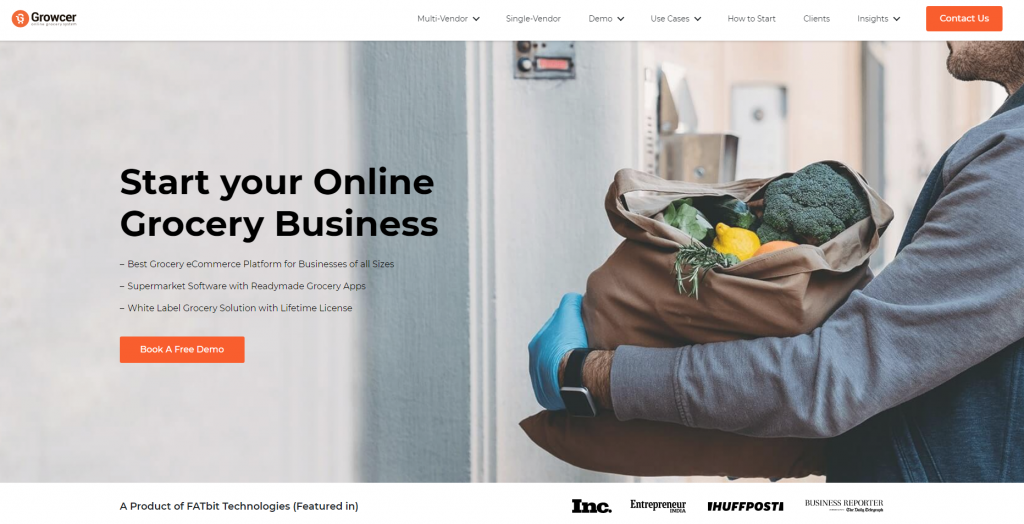
Growcer is a standalone grocery delivery software that is fully customizable. It comes equipped with robust grocery apps for buyers and delivery staff (both android and iOS). Offering a feature-rich web portal for admin, everything can be centrally managed. Mentioned below are a few features/benefits of Growcer that make it an impeccable software.
- Advanced Product Search
- Convenient Product Comparison
- Smooth Order Management
- Seamless Payment Integration
- Customer Analytics
- Inventory Management Module
- Store Management
- Delivery Management
- PWA and Hyperlocal
- Encrypted library core files
What makes Growcer a compelling and popular choice among entrepreneurs is that it offers 1-year free technical support, is cost-efficient with one-time payment and lifetime license. It is extremely secure and reliable, shielding users from hackers, leaks, and breaches, and to help businesses stay afloat during the pandemic, Growcer has incorporated advanced features to meet the evolving user requirements.
2. Yo!Kart

Built with state-of-the-art technologies, Yo!Kart is another grocery eCommerce platform that helps entrepreneurs and businesses to launch their grocery marketplace conveniently. The platform is equipped with the latest features and functionalities and offers mobile apps for iOS and Android. It is a self-hosted solution with an easy vendor management system. Other features of Yo!Kart are:
- Multilingual
- Offers Multi-currency functionality
- Multicart checkout
- Inventory management
- Streamlined shipping management
- Individual vendor storefronts
Apart from these, Yo!Kart offers free installation, 1 year of free technical support, a one-time licensing fee, and much more. It is highly scalable and has an intuitive user interface.
3. CS-Cart
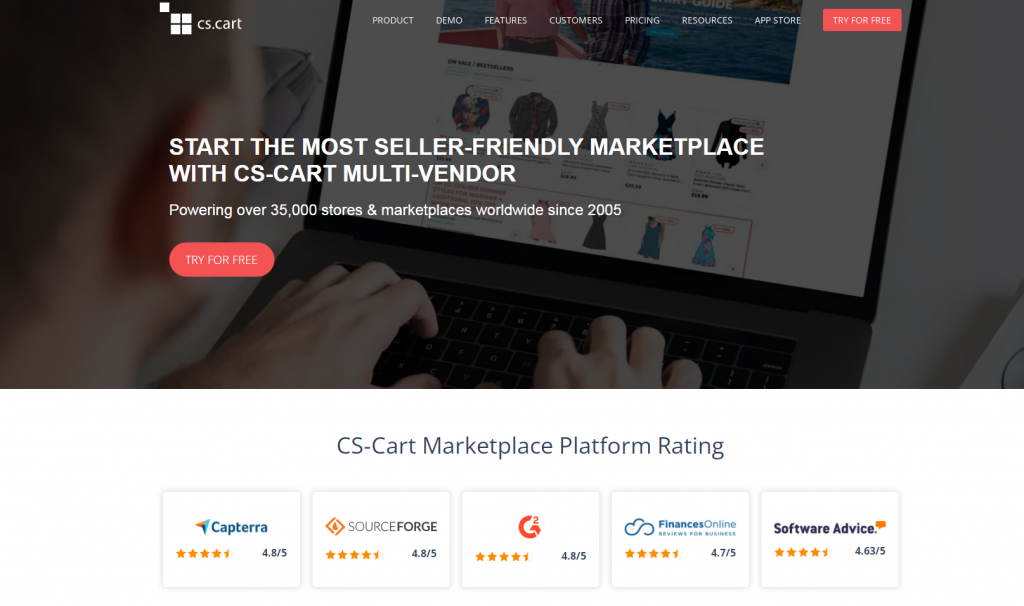
Cs-Cart is another well known name as a top multi-vendor eCommerce platform that facilitates entrepreneurs to launch their business with ease. It offers softwares for building both B2B and B2C grocery stores. Though CS-Cart leverages by offering 15 days of free trial, it charges an annual upgrade fee and has expensive customer support. The eCommerce platform has various features, is well organized to easily navigate and manage the grocery stores. To set up a store using CS-cart no programming skills are required.
4. Shopify
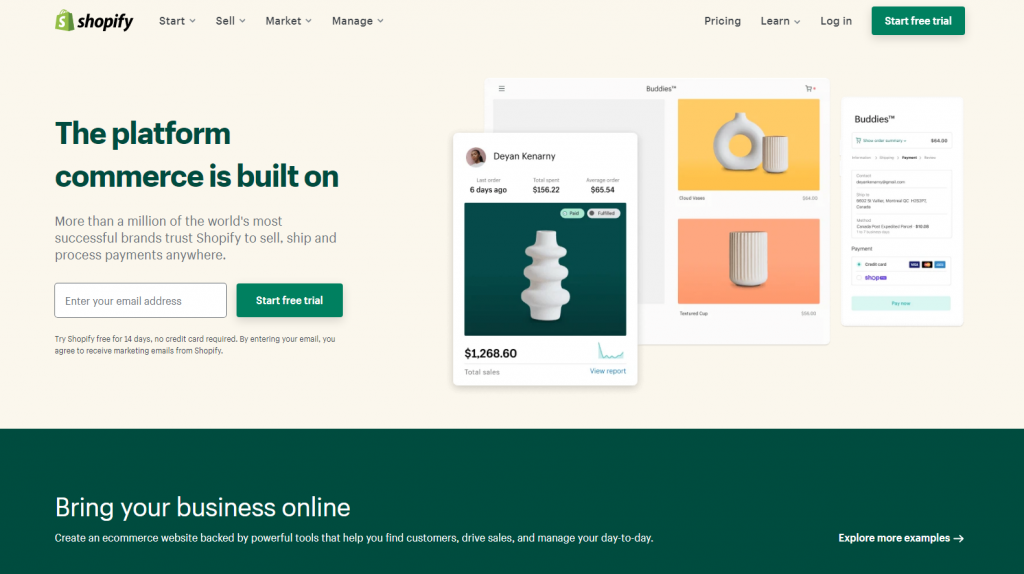
Shopify is another platform that helps startups to launch their business. It is a cloud based platform and any store, be it online fashion or grocery, Shopify supports all niches to get you started with your business. It offers various plans but is suitable for high-volume merchants. Shopify Plus offers customizations and templates are available but with limitations and at an additional cost. Whereas the SaaS model of Shopify reduces hardware and manpower costs. While choosing a cloud-based eCommerce solution price can be a matter of concern, varying from person to person. But, it is still a great platform to build any niche specific marketplace.
5. Tribe
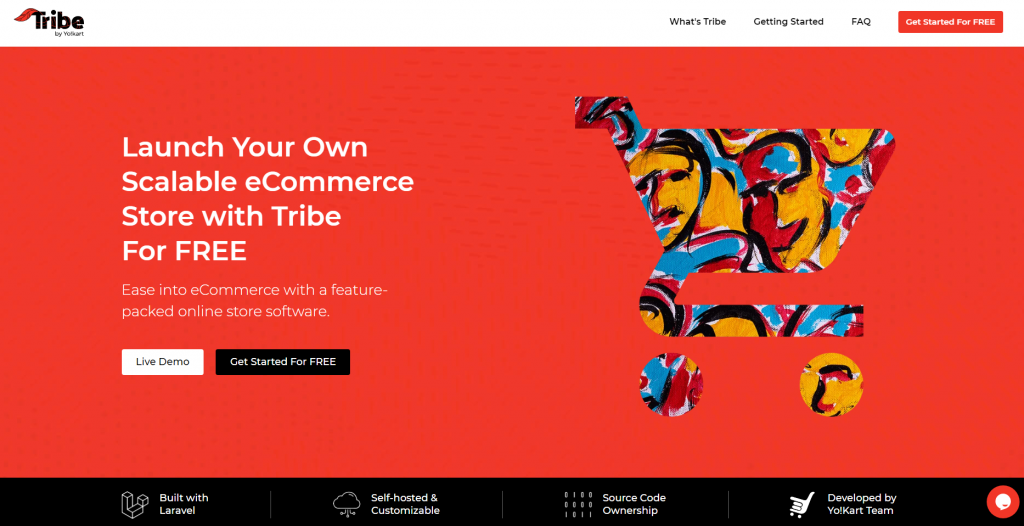
Built on laravel, Tribe is a sophisticated online grocery store software that facilitates small and medium-sized businesses to start their store for FREE. It has user-centric features that enable entrepreneurs and retailers to have a seamless, customizable, and secure online store with a lifetime license. Features of Tribe include:
-
- Offers source code ownership
- Free for lifetime
- Comes with pre-integrated APIs
- Inbuilt POS and drag & drop CMS builder
- Multi-lingual
- Multiple-payment gateways
The design is appealing, providing an intuitive dashboard for the admin to manage the entire store operations. Offering an impressive drag-and-drop CMS editor, personalizing store-front using Tribe is hassle-free.
6. Dokan Multivendor Marketplace
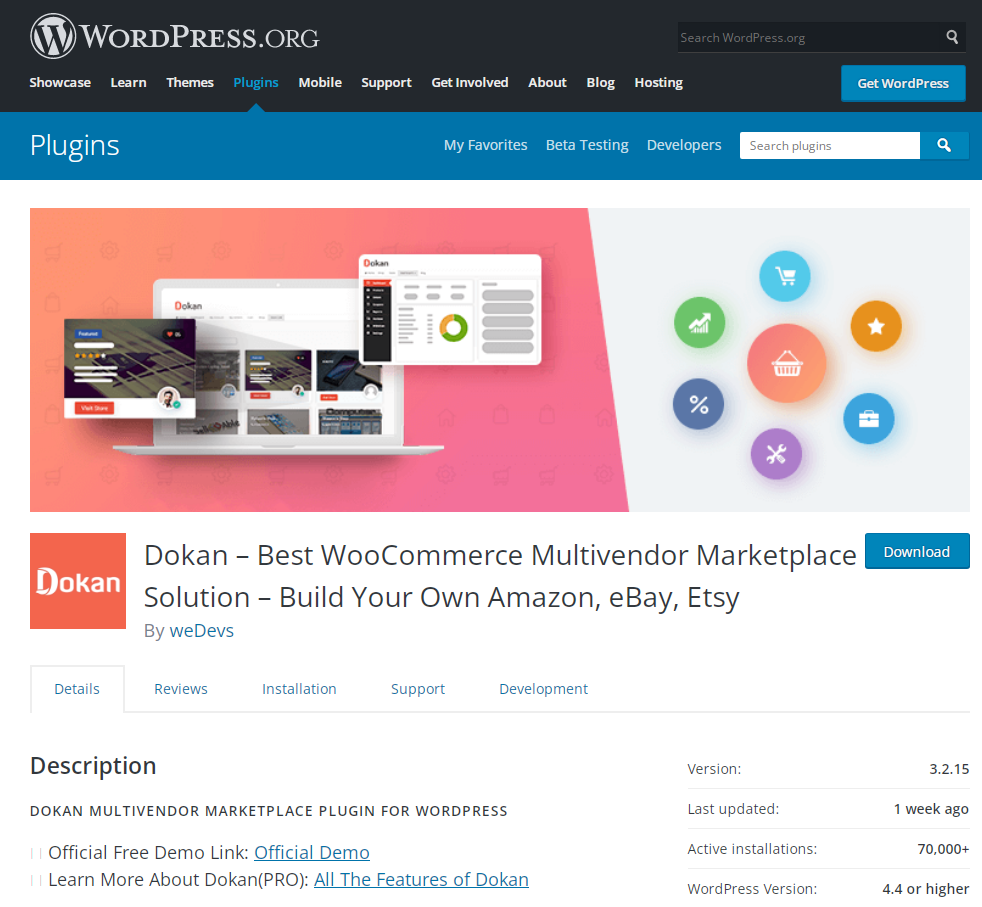
Powered by WooCommerce, Dokan is a multivendor marketplace plugin and eCommerce solution. It offers an exceptional front-end experience with an array of exceptional features. Whether you are trying to build a marketplace to sell digital or physical products, it can do it all. To view a store’s performance, Dokan also helps with report generation. With respect to its limitations, Dokan does not support WordPress multisite system, but it can be used on a single subdomain of your multisite installation.
7. Zielcommerce
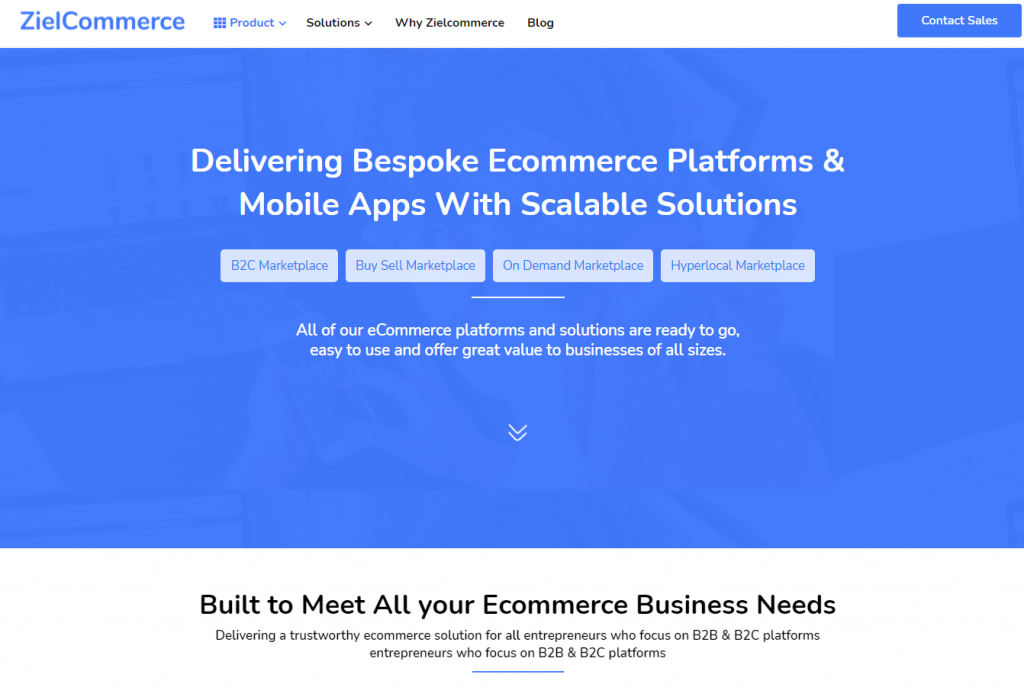
Zielcommerce is another readymade eCommerce solution that helps in launching an online eCommerce store quickly. Its mobile apps are enriched with marketing and management features that provide a seamless experience. Businesses of all types from B2B to B2C can be catered by the platform. Though a free version of the platform is available, there are no free trials on paid Zeilcommerce plans. The platform also caters to different niches including grocery so customization differs based on the type of software preferred.
8. My Cloud Grocer: Enterprise Grocery eCommerce Platform
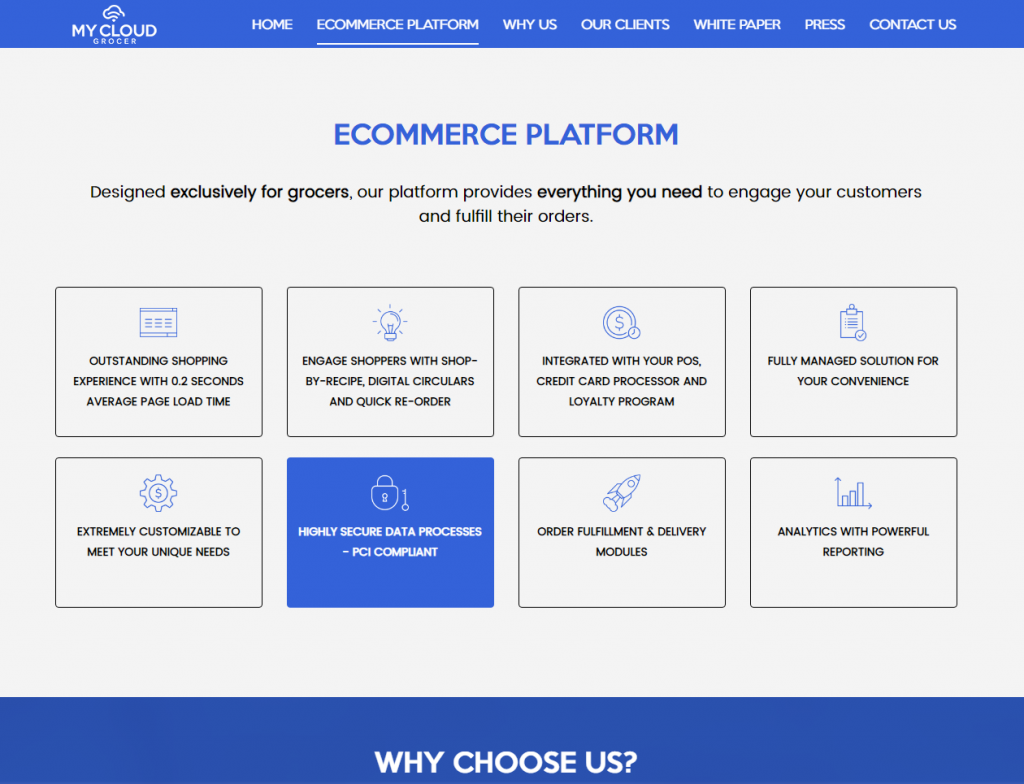
My Cloud Grocer is an enterprise eCommerce software designed to help supermarkets engage with buyers by delivering grocery orders to make sales. It is fully customizable and is packed with reporting and analytics capabilities, providing users with insights necessary to evaluate business performance. The biggest drawback, however, is that My Cloud Grocer does not offer a free trial, the live support is unavailable and training is not provided. But, the software supports integration with the existing point-of-sale systems, setting up a highly interoperable eCommerce environment.
9. BigCommerce

BigCommerce is a self-hosted, SaaS-based grocery eCommerce platform that has in-built SEO tools, pivotal to cater to the needs of fast-growing businesses. It is extremely scalable and has an unlimited bandwidth to sell products. There is no transaction fee and it supports multi-channel selling. But, the load time of the platform is high which can frustrate shoppers, the editing interface is difficult for beginners and customizations come at a hefty price. The basic plan of BigCommerce offers rating and reviews functionality, file storage, gift cards, and professional reporting.
10. Volusion
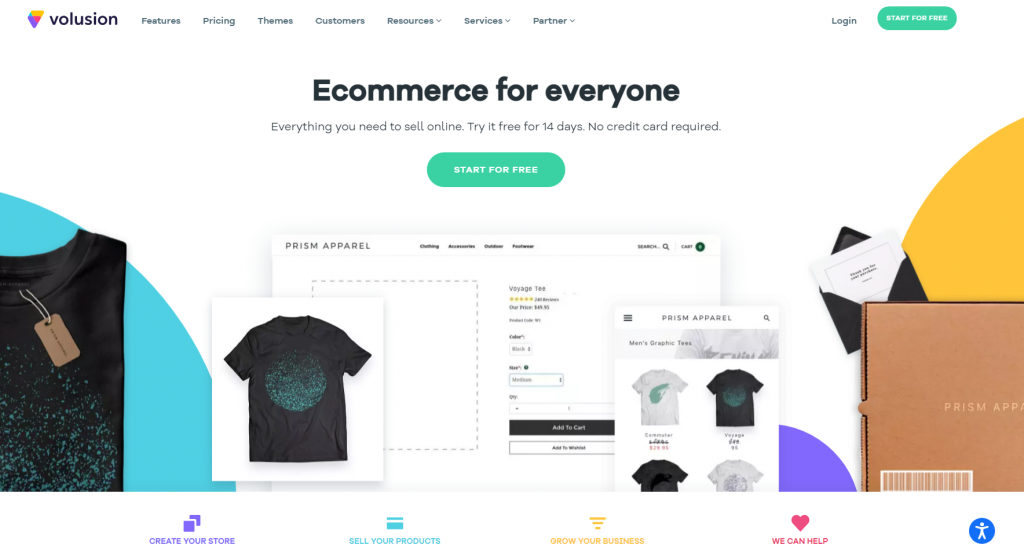
Volusion is a cloud-based grocery eCommerce platform that lets you build a fully functional store from scratch. It has easy drag and drop features with a plethora of responsive themes to choose from. Order fulfillment is made easy with its product management and native fulfillment features. While the mobile app offered is efficient but the load time is slower and the designing tools are limited. Nonetheless, Volusion has a great analytics tool, the customer support provided is excellent and it provides 14 days of a free trial.
Conclusion
The above-mentioned grocery eCommerce solutions are efficient in their own space, but for an entrepreneur, the right grocery software is that matches their business requirement and budget. Mostly, ready-made solutions are preferred by entrepreneurs as they are time-saving and cost-effective when compared to building an app or a website from scratch. To learn more about choosing a right ready-made solution, read the blog.


